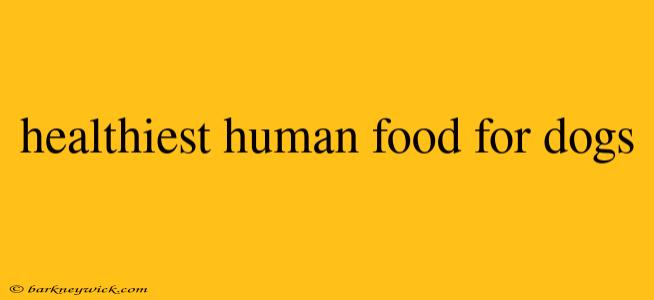Unlocking the Power of Human Food for Dogs: A Guide to Safe and Healthy Options
As a dog owner, I've always been fascinated by the human food that my furry friend, Luna, tries to sneak from the table. While we know certain foods are off-limits (chocolate, grapes, onions, etc.), there are many safe and healthy human foods that can benefit our canine companions.
The Benefits of Human Food for Dogs
In my opinion, human food can be a fantastic addition to a dog's diet, offering a diverse range of nutrients and flavors that can make mealtime more exciting. But it's crucial to understand which foods are safe and beneficial for dogs, and which are best avoided.
Safe Human Foods for Dogs
Here are some of the best human foods that are considered safe and healthy for dogs:
Fruits & Vegetables:
- Apples: A great source of fiber and vitamin C. Remember to remove the core and seeds.
- Bananas: A good source of potassium and vitamin B6, but they are high in sugar. Feed in moderation.
- Blueberries: Loaded with antioxidants, these tiny berries are a healthy treat.
- Broccoli: A good source of fiber and vitamins, but should be cooked and served in moderation.
- Carrots: Excellent for dental health and rich in vitamin A.
- Green beans: Low in calories and a good source of fiber.
- Peas: A great source of protein and fiber, but avoid canned peas due to high salt content.
- Pumpkin: A fiber-rich food that can help with digestion and urinary tract health.
Proteins:
- Chicken (cooked): A great source of lean protein.
- Fish (cooked): Fatty fish like salmon and tuna are good sources of omega-3 fatty acids.
- Eggs: A great source of protein, but avoid raw eggs due to the risk of salmonella.
- Yogurt (plain and unsweetened): A good source of probiotics that can help with digestive health.
Other Safe Options:
- Rice (cooked): A good source of carbohydrates and can help settle upset stomachs.
- Oatmeal (plain and unsweetened): A fiber-rich option that can be beneficial for dogs with digestive issues.
Important Considerations:
- Moderation is Key: Always offer human foods in moderation, as too much can lead to weight gain or digestive issues.
- Cooked vs. Raw: It's generally recommended to cook most human foods for dogs to avoid potential bacterial contamination.
- Consult Your Veterinarian: It's always a good idea to discuss any new food additions to your dog's diet with your veterinarian.
**Entity: ** The American Kennel Club (AKC) is a reputable organization that provides guidelines for dog owners, including safe human foods for dogs.
How to Introduce New Foods:
- Start Slow: Introduce new foods gradually, starting with small amounts.
- Monitor for Reactions: Watch for any signs of digestive upset, such as vomiting, diarrhea, or gas.
- Variety is Key: Offering a variety of human foods can help ensure your dog gets a balanced diet.
Conclusion:
While a balanced commercial dog food should form the basis of your dog's diet, incorporating safe and healthy human foods can offer a fun and nutritious alternative. Remember, moderation, consultation with your veterinarian, and careful observation are key to ensuring your furry friend enjoys the benefits of human food safely.
